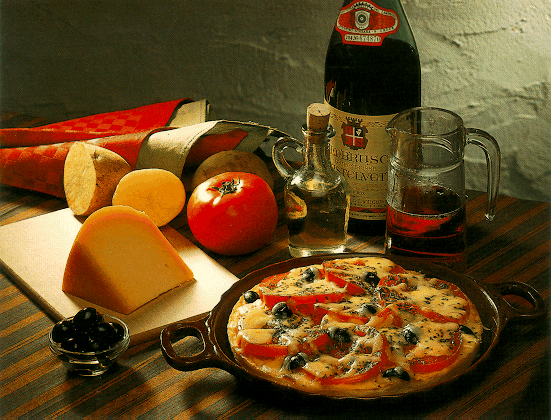
Torta Tarantina di Patate: a potato pizza with cheese


Storage at home: it's generally advisable to keep Dutch cheese in the refrigerator, however, if consumed quickly, a kitchen cupboard offers the most appropriate storage. If you keep cheese in the fridge, it should be removed about half an hour before serving.
Cheese which is too cold loses much of its aroma and flavour; just as with wine, cheese should be served at room temperature. To prevent cheese from becoming too dry it should be kept wrapped in aluminium foil or cling film. Don't keep for too long as it is better to shop regularly for cheese than to discover it has lost its flavour.
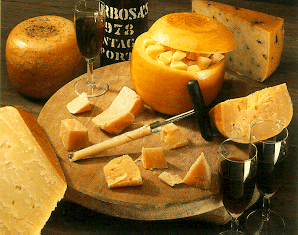 Succesfull Partners: Port with mature or aged Edam, Gouda, or Frisian
Clove cheeses
Succesfull Partners: Port with mature or aged Edam, Gouda, or Frisian
Clove cheeses
The most important rule is that cheese and wine are at their best when they complement each other. For a young mild or smooth cheese a ry, light wine is the best partner. A mature robust cheese demands a full-bodied red wine.
The sequence of serving cheese and wine is also an important point to
remember. Usually white wine precedes red. With cheese start with young
and progress to the aged, or from the mild to the piquant.
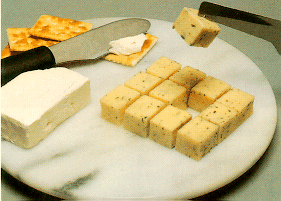 Small knife for spreading fresh soft cheese and a traditional cheese
knife (right) for cutting and presenting cheese.
Small knife for spreading fresh soft cheese and a traditional cheese
knife (right) for cutting and presenting cheese.
In many countries it's the usual custom to serve a cheeseboard at the end
of a meal, but a selection of cheese can also be served in the evening with
suitable wines. It's not a hard and fast rule that only soft French cheeses
can be used, as Dutch cheeses complement wines extremely well. The choice is
endless - from an elegant platter comprising Gouda, Maasdam and Kernhem
cheese, to a slightly more piquant board consisting of mature Gouda, Kernhem
and Leyden cheese. Another idea might be to compose your cheeseboard using
the light and mild to the robust and piquant. A platter comprising of Edam,
Maasdam and Subenhara (or herb Gouda), in addition to aged Gouda and Leyden.
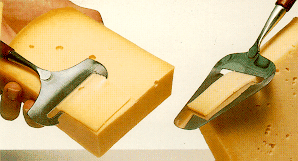 The `long' cheeseslicer for slicing mature and hard cheese and a shorter
version (left) which is better for slicing young and softer cheeses.
The `long' cheeseslicer for slicing mature and hard cheese and a shorter
version (left) which is better for slicing young and softer cheeses.
Cheese is very versatile and has many culinary applications. Apart from
your own preference, its melting qualities when exposed to heat, may also
dictate your choice. Hard and semi-hard varieties melt more slowly than soft
cheeses and tolerate higher temperatures. Therefore mature and aged Gouda,
for example, are particularly suitable for making a dish `au gratin', which
is a topping of grated cheese, grilled briefly. Grated aged Gouda or Edam make
ideal toppings on macaroni or spaghetti.
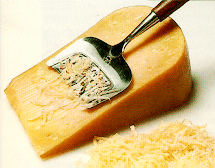 The mini cheese grate ideal for grating small quantities of cheese.
The mini cheese grate ideal for grating small quantities of cheese.
Edam is ideal for those dishes where it is desirable for the cheese to keep
its shape such as toasted sandwiches and deep-fried cheese. As cheese contains
salt, this should be taken into consideration when used as an ingredient. Edam
particularly is so versatile as it grates, slices and cubes easily and does not
crumble like other popular hard cheeses, and thus is ideal for cooking,
whether in a sauce, salad or as a snack. Vegetarians have long been aware that
cheese is an excellent substitue for meat
(Nutritional value).
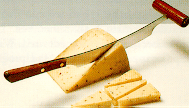 The cheesecutter with hand grips, for cutting large pieces and preparing
canapes.
The cheesecutter with hand grips, for cutting large pieces and preparing
canapes.